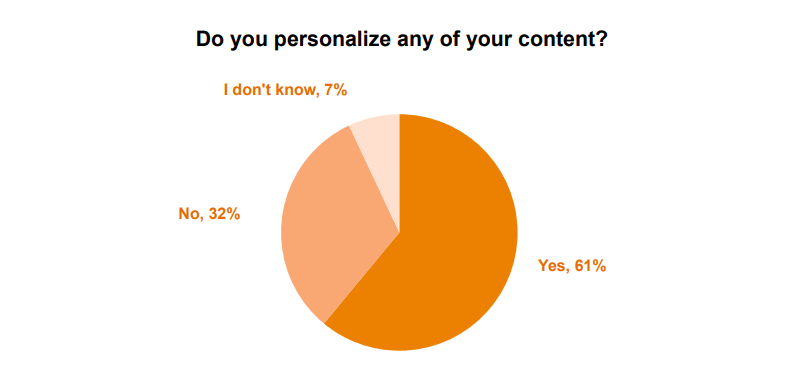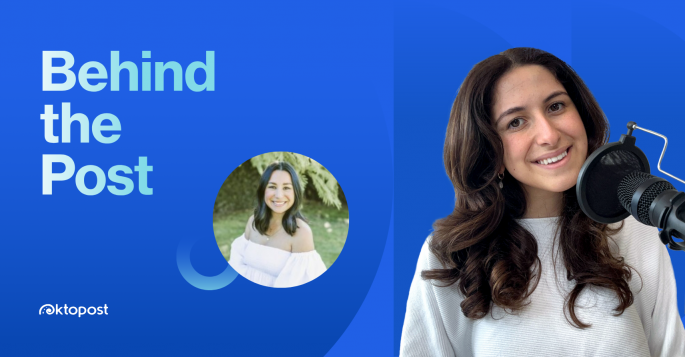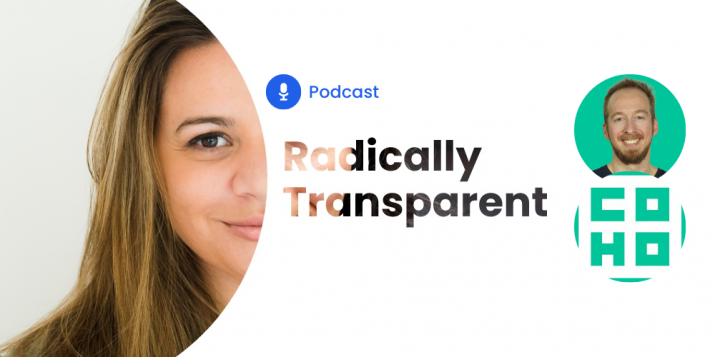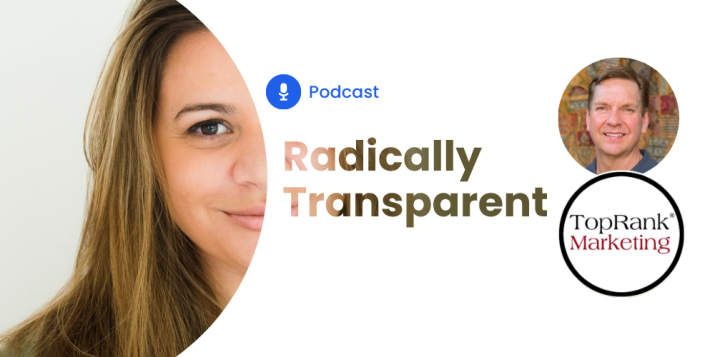
How content personalization can generate better leads
You might have a fantastic product and the perfect sales pitch, but none of that matters if you don’t have leads who might want to buy what you’re offering. For B2B marketers, finding new and promising leads is a never-ending challenge. One of the hottest marketing trends to come along in recent years is content personalization, which might provide them a path out of the lead generation wilderness.
B2B sales have always depended heavily on content marketing, and adding personalization to the mix can be incredibly effective at capturing attention and forging real connections. This isn’t up for debate among marketers: 90% insist that personalization is a major factor in keeping their businesses profitable. 60% claim that marketing personalization plays a key role in improving lead quality. Traditionally, personalization is seen as something for sales to bring into the process once they begin engaging with potential customers. However, personalized appeals can also help companies find the best leads and get them into the sales funnel in the first place.
It’s not hard to argue in favor of content personalization, but figuring out how to actually implement it is another matter entirely. Let’s explore the concept a little further by looking at exactly how content personalization works in a B2B context, particularly for lead generation.
What is content personalization?
Since ancient times, when marketers discovered that emails with the recipient’s name in the subject line were more likely to get opened, content personalization gone through a few evolutionary phases. However, if we sum it down, with great data comes great personalization. Most personalization efforts will leverage customer data to create entire experiences that are more directly relevant to the target’s interests, concerns, and desires. The purpose of these journeys is to provide greater value to the customer, build trust, and (hopefully) increase the likelihood of conversion.

What are the benefits of content personalization for B2B?
The acclaim and adoption rates for content personalization in marketing prove that it renders real and tangible benefits. Personalized experiences show your customers that you understand what they want and are willing to take the time to address their concerns on an individual level. The “personal touch” deepens their engagement and engenders positive feelings, resulting in the following desirable outcomes:
- Boosting conversion rates
- Polishing up your brand reputation and authority
- More engagement with the rest of your marketing campaign content

By targeting customers with personalized content about where they currently are in their buyer journey, you can gain insights about their future purchasing intent from how they interact with the content. This approach can be used on your initial contacts at the very top of the sales funnel, allowing you to make reliable inferences about lead quality from a very early stage.
Recommended for further reading
What are the stages of content personalization for lead generation?
Using content personalization for lead generation can best be considered a multi-stage process. Each stage builds upon the previous one to create a framework that attracts high-quality leads and identifies them as quickly as possible. The stages are:
- Build your brand awareness and reputation, using personalized content to establish your credibility and expertise, positioning yourself as a thought leader.
- Define your target audience and customer personas. Use demographic and behavioral data to segment your audience and determine what types of content will lead to the most engagement.
- Launch campaigns across all relevant channels to retarget leads and nurture them with relevant content.
- Bring sales and marketing together, working as a harmonious unit to deliver consistent messaging and exchange helpful insights with each other.
What types of content personalization are used for lead generation?
What defines a person, anyway? Their demographics? Their individual characteristics? The thoughts and desires in their heads? These are deep philosophical questions. If you’re asking a B2B marketer, the answer is “all of the above, depending on your content marketing strategy.” There are several frameworks you can choose from for delivering personalized content.
One way is to create a customer persona – a semi-fictional target based on data from user research and web analytics that depicts the essential qualities of a big part of your audience. You can build your content around the persona and deliver it to audiences that have been segmented to match it.
Another option is to personalize based on where the customer is at in their buyer journey. Buyers showing interest at the top of the funnel will have very different questions and concerns than buyers near the bottom, readying themselves to make a final decision.
You can also take an account-based marketing (ABM) approach and create content tailored to specific organizations or individuals with purchase-making authority. ABM may be the most extreme form of content personalization, but it can be really effective.
3 Ways to generate more B2B leads with content personalization
Discussing content personalization in the abstract can help firm up your strategic goals, but what does it look like in practice? Here are a few ideas for putting content personalization to work for B2B lead generation.
1. Follow the data
Nobody wants to be a statistic, viewed as just a set of numbers instead of a person. So turn that idea around—leverage your customer data to turn numbers and statistics into a meaningful picture of the people you’re trying to engage.

Customer data can reveal not only demographic information but also:
- What customers are looking for
- How they found you
- What positions do they hold in their respective organizations
- How they’re behaving in reaction to your content
Add social media data into that mix, and you’ve got everything you need to understand your lead’s intentions and create the kind of content they want to consume.
Bonus: Remember, this is B2B. B2B marketers can and should not only leverage personal data but also leverage firmographic data to create account based web experiences with content that is personalized not only for the specific person but per company.
2. Personalize your website content
There’s no place where you have more control over your messaging and content than your website. It’s essential to shepherd leads there so you can dazzle them with the full effect of your content personalization wizardry. With real-time website content personalization tools, you can start customizing their experience as soon as they arrive at a landing page.
Customer personas and data from referral sources can help you get started with personalization immediately, but website interactions can get you more specific and relevant information about what the customer wants – right now.
This intent data is worth its weight in gold. Compliment it with website surveys, quizzes, and calculators to keep your leads engaged while enriching their profiles with data for further personalize their experiences.
3. Provide the right information at the right time
As every marketer knows, timing is everything, making it hard to decide when to deploy targeted marketing content. There are a few different methods for taking the stress and guesswork out of it.
The goal is always conversion, so one way to approach this problem is to use content personalization to provide highly relevant and targeted offers to leads. If you’ve segmented your audience correctly, you should be able to provide offers that lead to genuine purchasing interest and won’t be able to refuse.
Another tactic is to use an attribution-based personalization tool, which maps out customer journeys by pinpointing the content that is succeeding at moving leads down the funnel. Once you know how your content is performing, you can better determine who to show it to and when to speed up your sales pipeline and qualify leads more efficiently.
Content personalization: from leads to conversions
One of the most reliable signs that a lead will eventually purchase from you is that they actively engage with your content. Content personalization is the most effective way to make content that will keep your audiences engaged because it must be built around their personas: who they are and what they want. For the best results, personalization must be part of content development from the beginning; it won’t read as authentic or work as well if you tack it on as an afterthought.
Content personalization also requires rich and timely customer data. Don’t forget that social media can be an excellent source of that data, as well as a source for leads themselves. One of the best ways to take advantage of this resource is with an automated social media management solution designed for B2B marketers, set up to deliver a steady influx of customer data and new prospects while you focus on creating an unbeatable content personalization strategy.


